How and Why to Capitalize on Brand Mentions in the AI Era
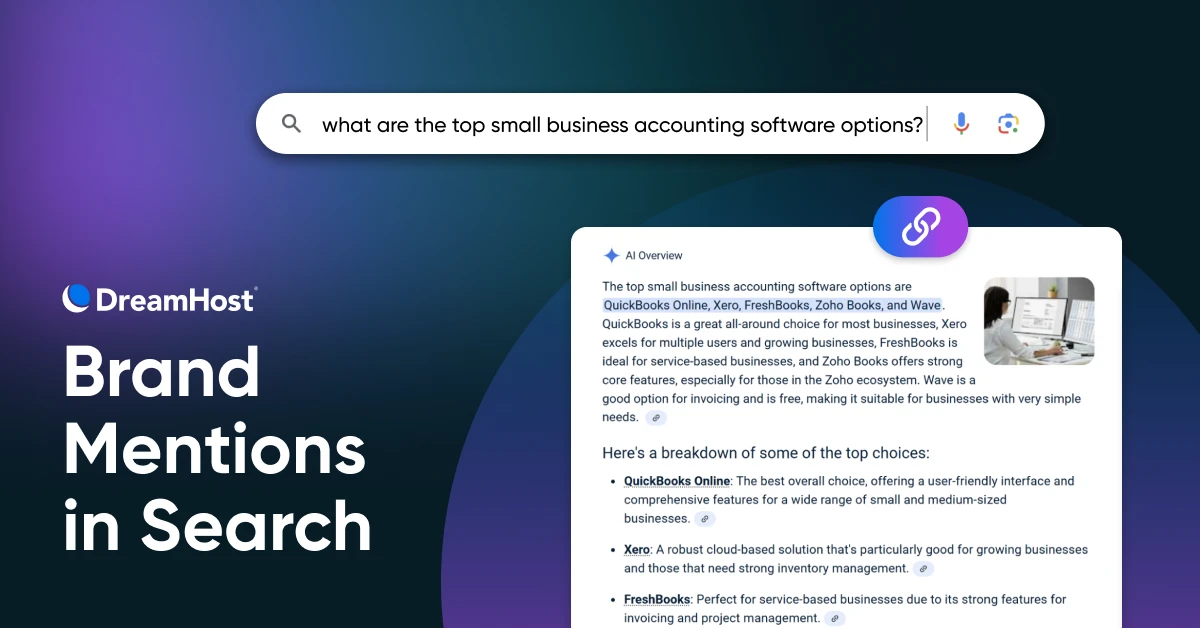
TL;DR:
- The new reality: AI search tools are changing how people find brands. 58.5% of U.S. Google searches now end with no click to another site. Instead of clicking through results, users get direct answers that mention specific companies by name. If ChatGPT or Google’s AI doesn’t mention your brand when someone asks for recommendations in your space, you’re invisible.
- The fix: Create content worth citing, engage authentically in communities, and pitch journalists with solid data. Your SEO work still matters—over 90% of Google AI Overviews link to sites already ranking in the top 10. But now you need to optimize for getting mentioned, not just getting clicked.
Bartering.
Beautiful shells.
Physical gold pieces.
Digital crypto coins.
One constant throughout time is that humans have exchanged currency, and those currencies change.
In the marketing space, it’s been quite a while since we’ve seen a major shift in the currency that leads to clicks.
So how lucky are we to be witnessing one right before our very eyes?!
via GIPHY
Today, brand mentions are swiftly becoming the key currency thanks to a burgeoning AI search economy.
Gibberish to you? Don’t worry.
This practical guide will help you understand AI search, brand mentions, and GEO. Plus, how to evolve your marketing to deal in this budding capital without abandoning the SEO strategy you’ve worked so hard to build.
What Are AI Search and Brand Mentions?
From the top. What do we mean by AI search?
AI search typically involves a person using artificial intelligence, usually a large language model (LLM) such as ChatGPT, to look for information, products, or services. Instead of returning a long, ranked list of links like Google and other search engines do, the AI platform aims to provide the answer straight away.
The context-aware answer is the major difference between AI search and traditional search driven by search engines.
Users tell search engines what they’re looking for using keywords, and the search engine provides links to pages that contain those words and phrases. From there, it’s up to the person to visit those links and further suss out their desired information.
With AI search, you just ask a question, and it does its best to understand the context vs. only the keywords.
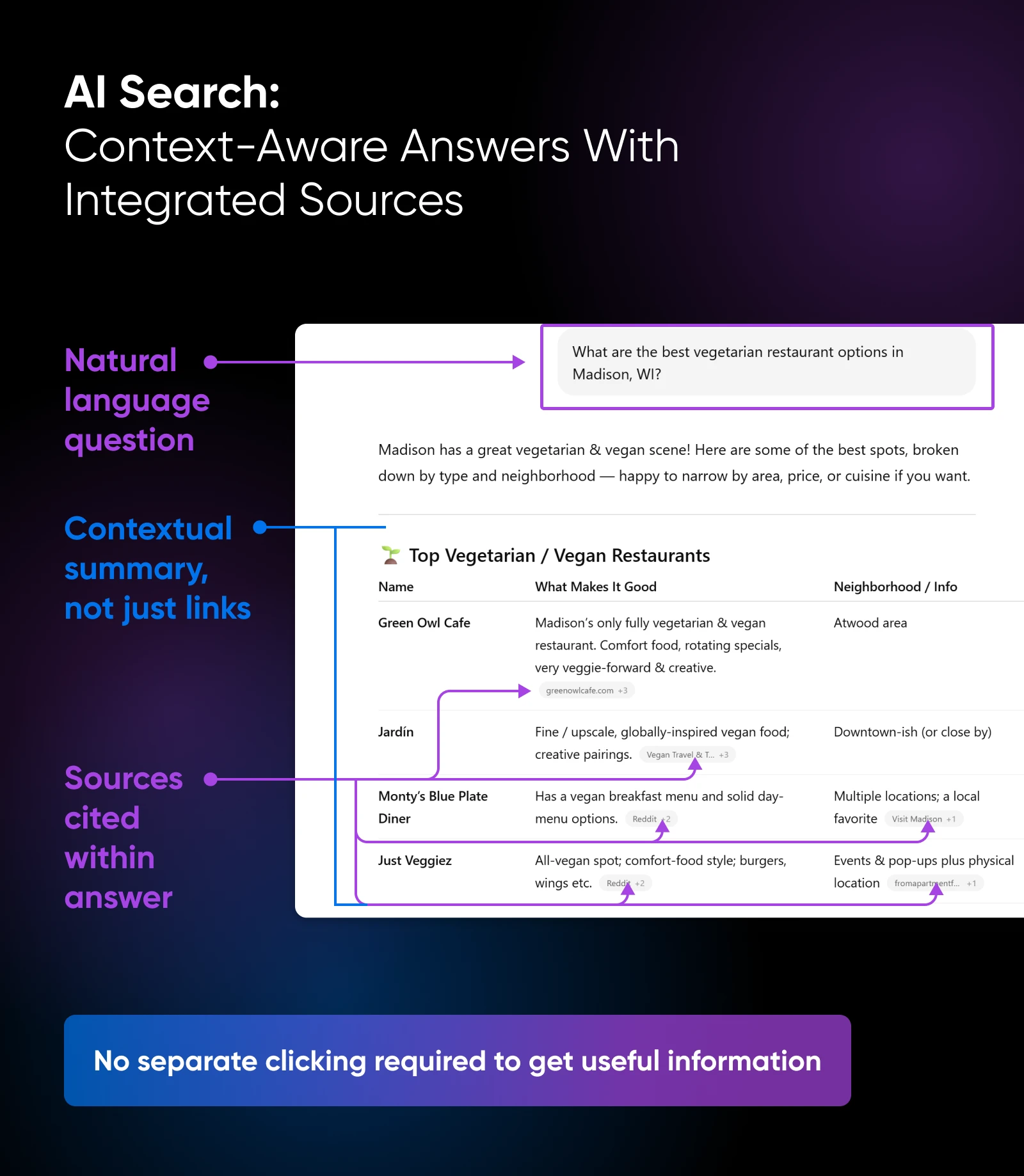
With this information, it finds sources using a variety of qualifications and summarizes them into a tidy, direct response. Plus, with AI, you can often ask follow-up questions to find more answers.
This is called a zero-click search. And today, the majority of Google searches (58.5% in the U.S.) end with no click to another site. Of course, not all of these are because of Google’s AI Overview (powered by the Gemini LLM) feature, but most signs indicate it’s a growing reason.
For example, news-related queries on ChatGPT are rapidly increasing, while at the same exact time, similar Google searches are on the decline. This is just one real-life instance of user preferences shifting toward AI when it comes to information retrieval in their everyday lives.
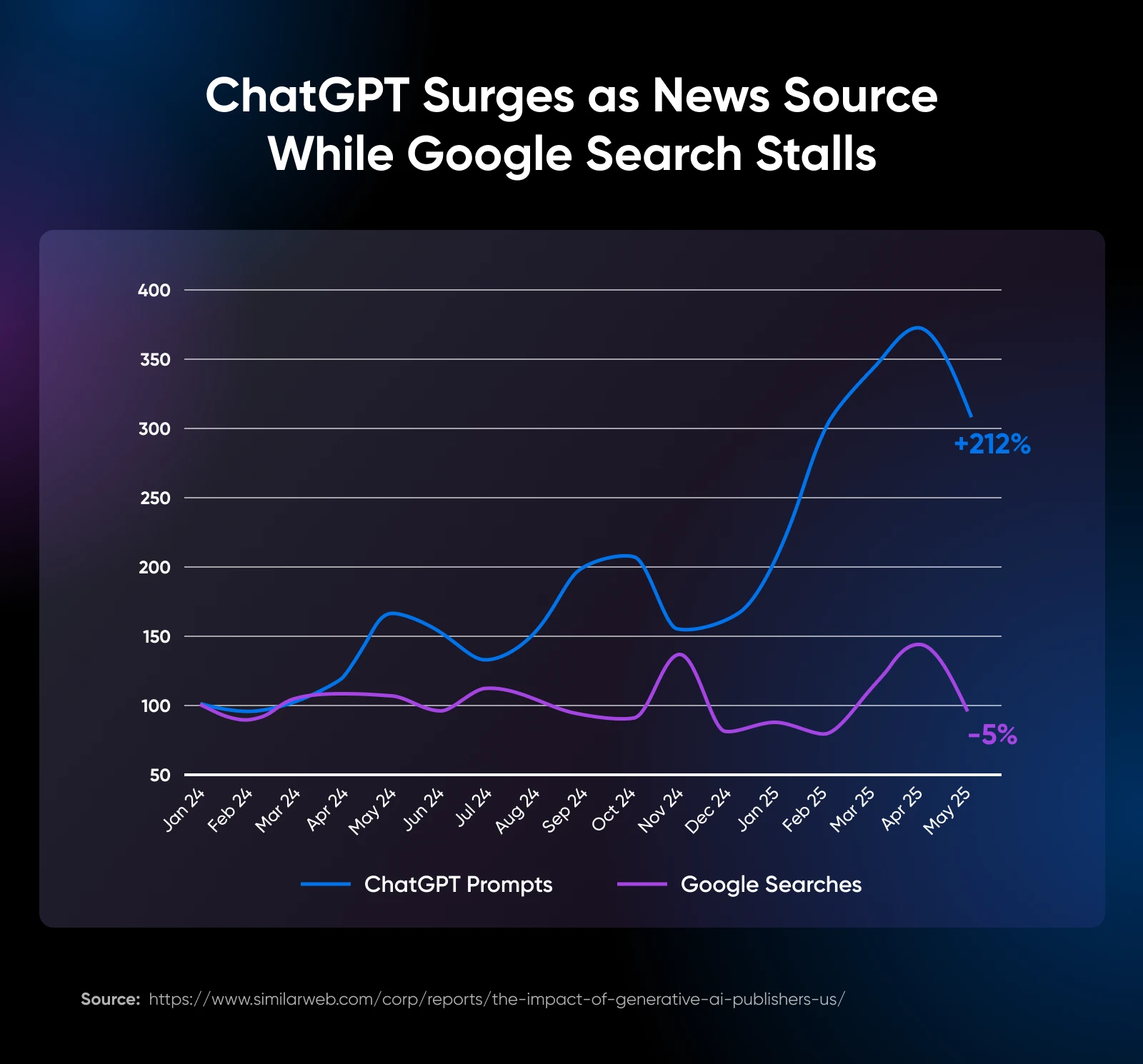
So if it isn’t high-ranking Google and other search engine links, what’s the new currency for brands looking to get in front of consumers?
Brand mentions.
In the world of AI search, a brand mention is what happens when an AI’s response calls out a specific brand (or product, or service) by name — even when it doesn’t actually link to the brand’s website. (That’s called a citation, which is also important but a whole ‘nother topic for a later date!)
For instance, if someone asks an LLM about the best SEO tools for small businesses, it might respond with a list of brand names, including Moz, Ahrefs, Yoast, and more.
Someone could do this to find recommendations for anything — including what you sell.
Commentby from discussioninChatGPT
So, why does all this matter?
You’re asking the right questions. Let’s go.
What Does the Rising Significance of Brand Mentions Mean?
Even without direct links to a brand’s sites, being mentioned in AI search results increases visibility and signals an element of credibility.
Brand mentions show the strongest correlation with appearing in Google’s AI Overview. And the vast majority of people do trust AI results.
Yes, AI can absolutely return wrong information, as this scathing article points out. So when factual correctness is critical to your search, always double-check your results!
“I get around this by not valuing the AI for its output, but for its process. Treat it like a brilliant but clumsy assistant that does tasks for you without complaint – but whose work needs to be double checked.” – HackerNews user
The growth of zero-click searches also tells us something: both organic and paid traffic via Google is declining. Instead, Google’s AI Overview is earning all the eyes.
Gartner predicts that by 2026, traditional search engine volume will drop a massive 25%.
Where’s it going? Specifically, to generative AI tools and platforms. Then there’s also research that indicates a decrease in clicks on paid ads whenever Google’s AI Overview also shows up on the search results page.
In addition, Semrush forecasts the number of AI searchers to overtake the number of traditional search engine users in 2028.
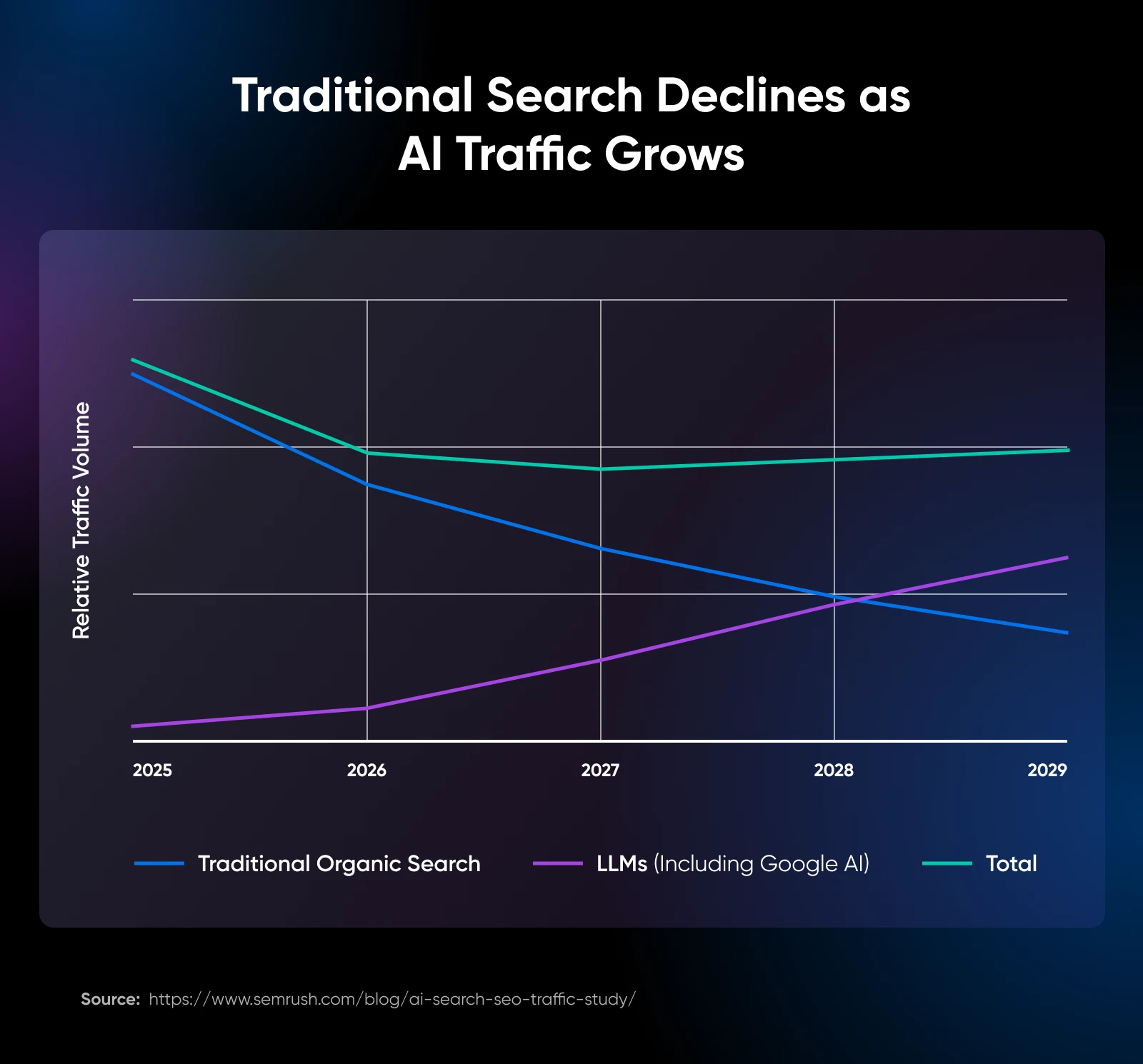
Google AI Overview and other LLMs are the Model Ts, while the regular ol’ search engines and results pages are the horses they’re widely replacing.
These AI-powered search vehicles are faster, more efficient, becoming widely adopted, and, overall, here to stay.
Now, let’s discuss how to harness its power and out-gallop your competition on the new AI-powered web.
From SEO to GEO: How Can You Build Your AI Brand Mentions?
OK, we promise to introduce just one more brand-new phrase in this article: GEO.
GEO stands for generative engine optimization. Just like its close relative SEO, it’s a strategy that centers on making your content shine — only through an AI lens this time.
Instead of the focus on rankings on traditional search engines, GEO is all about helping your brand rise to the top and earn a shout-out in AI-generated answers.
With that in mind, let’s dive into actionable strategies marketers can implement to generate brand mentions through building GEO that works hand in hand with existing SEO efforts.
Fresh Digital PR Approaches
These smart strategies can help you turn breaking news, fresh data, and expert insights into brand mentions that both the media and AI can’t ignore.
- Try “newsjacking”: When news breaks, people search. When people search, AI responds. By quickly publishing content that ties your brand to a trending story, you can get cited by journalists and surface in AI results.
- Make your data irresistible: When you produce trustworthy original research (think surveys, benchmark reports, industry analyses, etc.), you create highly quotable assets that can be pitched to journalists, media outlets, and influencers. The more they republish this content, the higher the chances of AI mentioning your brand when it picks up this info.
- Learn the art of journalist outreach: Platforms like HARO (Help a Reporter Out) and Qwoted connect journalists with subject matter experts (SMEs) — that’s you. By responding quickly with sharp, quotable insights, you can land brand mentions in respected publications — and AI mentions.
Community-Based Content Creation Tips
Show up authentically in your communities to build authority that leads to lasting mentions in AI-driven search.
- Engage on Reddit: Reddit often ranks high in search and is cited by AI. And its users value authenticity above almost anything else. Instead of just dropping links, contribute to discussions in relevant subreddits. Over time, you’ll build authority and chances to naturally mention your brand. The mentions will follow.
- Get involved with your industry forums: Forums may feel old-school, but they’re still treasure troves of trusted insights in niche spaces. The more your brand name comes up alongside expert tutorials, first-hand case studies, and even think pieces; the more likely your contributions will be referenced in other content and eventually AI responses.
Win More Mentions via Long-Form Content
When it comes to both SEO and GEO, coverage and competency are key to standing out. These can both be achieved with thoughtful, longer-form content.
- Challenge the status quo: An against-the-grain take — that you can back up! — lends your brand a unique voice and may earn mentions on discussion sites, social media, and hopefully AI results.
- Compile original research: Don’t just blog — investigate. Create whitepapers and case studies that lay out clear findings and methodology. These resources become evergreen references that AI tools can pull into answers for years.
- Round up the best: Curate deep, interesting insights that are relevant to your brand. Even better if you can add your own editorial analysis and package it all up into a definitive resource. This elevates your content into something worth mentioning.
- Increase your presence among third parties: AI engines mention content from third-party sites more than any other source. Guest posting and publishing in each AI platform’s preferred place may increase your odds of brand mentions:
- Perplexity: Favors YouTube and PeerSpot.
- Google Gemini: Frequently pulls content from Medium, Reddit, and YouTube.
- ChatGPT: Often references LinkedIn, G2, and Gartner Peer Reviews.
We Repeat: Don’t Take Your Eyes off the SEO Prize!
Great news for you SEO nerds…
via GIPHY
…AI search still heavily works similarly to traditional search engine ranking.
The proof is in the pudding.
More than 90% of the time, Google AI Overviews link to a website that’s already in the top ten search results. And 66% of the time, the information and links in AI Overviews overlap with featured snippets.
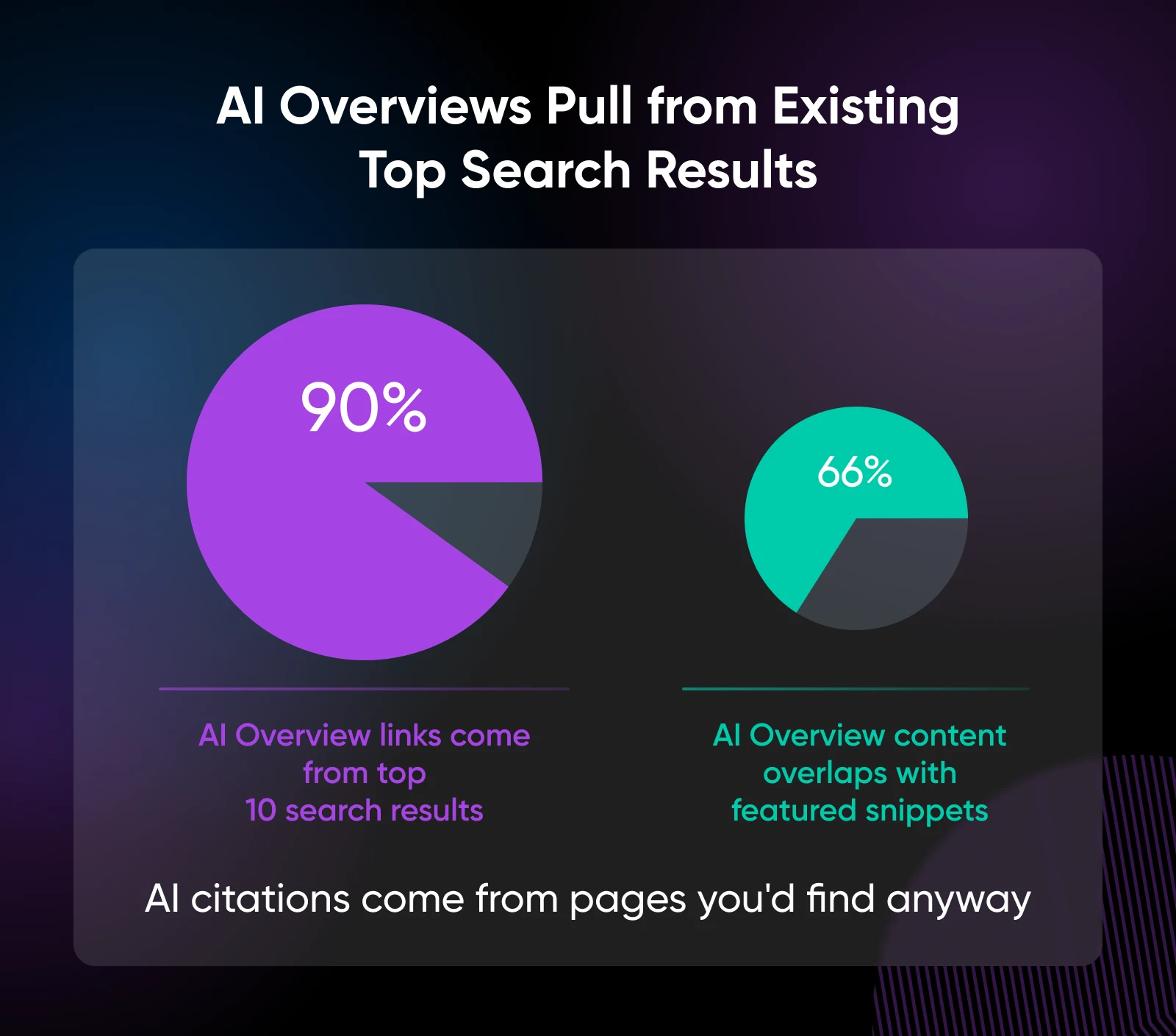
If you’re not still optimizing for search engines, you’re also less likely to earn brand mentions in AI-based searches. So beyond the basics (keyword optimization, improving site speed, etc.), here are a few slightly more advanced plays to improve SEO.
- Refresh evergreen content: Update older content with new statistics, images, and links to remain a relevant, current resource for search engine crawlers.
- Add schema markup: Improve organization to help search engines and AI better understand and surface your content.
- Target conversational queries: AI tools often pull from natural-language phrasing, so focus on long-tail and question-based keywords.
- Build topical authority: Cluster content around core themes so you become the trusted source in that space.
Brand Mention FAQs
What are brand mentions in AI search?
Brand mentions are when your company, product, or service is named in a search result on an AI platform (Like ChatGPT) or Google’s AI Overview. Typically, these don’t include a direct link to your website.
Why are brand mentions important in the AI age?
The stats say that people do pay attention to and trust AI search results, so brand mentions are great for increasing online visibility and credibility. This is critical at a time when zero-click searches are on the rise — which is when someone never needs to click away from the search results page because their question was answered there, often by an AI summary.
How do brand mentions differ from backlinks?
Backlinks are, well, links that send traffic back to your website. Before AI-powered search result summaries were prevalent, these were the bread and butter of getting possible customers to your site. But now, in AI-driven search, mentions matter as much as backlinks. And considering the trend toward zero-click searches, they can sometimes be even more important.
Do I still need SEO when brand mentions are so critical?
Simply, heck yeah! AI results are very often based on high-ranking search results. Those rankings happen thanks to thoughtful SEO. Therefore, without strong SEO, it’s likely you’ll struggle to beat out your competition to build mentions.
AI Search Success Belongs to the Mentioned
AI search is rewriting the rules as we speak.
And as it does, brand mentions are quickly becoming the new currency of visibility.
The brand owners and marketers who adapt early — blending SEO with GEO, investing in PR, showing up in their communities, and creating truly citation-worthy content — will be the ones who thrive.



